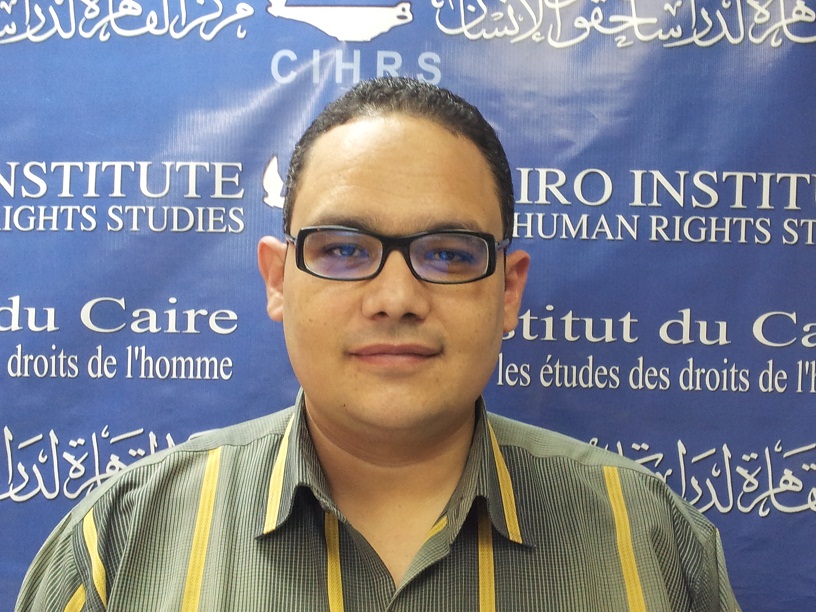 The Constituent Assembly tasked with drafting the constitution will face its fate on Tuesday before Cairo’s Administrative Court, with many civil political parties and movements hoping for a verdict which will bring about the assembly’s dissolution. On the other hand, the Muslim Brotherhood is fighting to keep the current makeup of the assembly as is, levying accusations of bias and unprofessionalism at independent local media that allowed the opportunity for other parties to oppose the drafting process.
The Constituent Assembly tasked with drafting the constitution will face its fate on Tuesday before Cairo’s Administrative Court, with many civil political parties and movements hoping for a verdict which will bring about the assembly’s dissolution. On the other hand, the Muslim Brotherhood is fighting to keep the current makeup of the assembly as is, levying accusations of bias and unprofessionalism at independent local media that allowed the opportunity for other parties to oppose the drafting process.
The current draft constitution has faced criticism not only from liberal and leftist parties, but has also come under fire from conservative Salafi movements, albeit for very different reasons. From the Salafi point of view, the draft constitution is not ‘Islamic enough.’ From the middle ground, presidential candidate Abdel Moneim Aboul Fotouh’s newly formed party ‘Strong Egypt’ also issued its first declaration, rejecting the draft constitution.
The draft, recently opened up to public discussion, contributed to the mobilization of Egypt’s civil political forces, with the aim of ensuring that the current draft constitution does not pass. As is, not only does the current draft constitution challenge the concepts of human rights and freedom, it also allows the state to become a guarantor for society, defies the idea of a modern state and seeks to sow the seeds of a religious state in Egypt.
The first part of the draft constitution stipulates the state’s protection of the “cultural and civilizational unity” of Egyptian society, adding that it shall ensure “the authentic character of the Egyptian family, and the protection of its traditions and moral values.” It also indicates that the state has an obligation to “empower authentic Egyptian traditions.” The use of such vague terminology can only be seen in the framework of the state’s efforts to impose a patriarchal understanding of society, one which allows interference in its citizens’ private lives.
Ironically, the chapter on rights and freedoms imposes several restrictions. In Article 30, the draft constitution states that all citizens are equal before the law, and will not be discriminated against on the basis of religion and belief, among other things. Yet in Article 37, the draft constitution restricts the right to build houses of worship to the three monotheistic religions – Judaism, Christianity and Islam. Article 37 distinguishes between citizens on the basis of religion, and is an example of how the draft constitution itself contains contradictions.
It also restricts the right to exchange information using concerns over national security as a justification. This is yet another example of vague wording which allows governmental intuitions to deny citizens, particularly journalists and researchers, the opportunity to obtain or disseminate information. An example of this in practice was seen when Egyptian authoritiesbanned a popular history book under the pretext of maintaining national security.
Freedom of online expression is also at risk in the draft constitution. Article 43 states that the establishment of digital media will be regulated by the law, albeit with the added qualifier that it will be done “without restricting their freedom and independence.” This article is in line with statements made in the past by Islamist political groups expressing a desire to limit freedom of expression online. The wording also opens the door to legislation that could restrict these rights. This kind of wording appears in other articles, including those relating to the right to peaceful assembly and to build houses of worship.
Another point of contention in the draft is the complete absence of the term ‘torture’ in the text, with the Constituent Assembly firmly ignoring international human rights treaties signed by Egypt. This is in stark contrast with the 1971 Constitution, which labeled these treaties a part of Egyptian law.
In regards to women’s rights, Article 68 (previously Article 36) ensures the equality of men and women without prejudice, as long as it is not in conflict with the “provisions ( أحكام ) of Islamic law.” This is another example of the draft constitution’s inconsistency, since Article 2 states that the “principles ( مبادئ ) of Islamic law” are the main source of legislation. This inconsistency reveals an inherent desire to move further away from the idea of gender equality, and chips away at gains made in Egypt in regards to women’s rights.
The text of this article allows the legislature to rely on religious jurisprudence, which includes a large number of disparate texts that are often taken out of context, as they originated in a previous era to address the problems of a different society. This would easily lead the legislative process down a subjective path, influenced by the personal and political whims of those tasked with interpreting the text. In addition, the current text would allow Islamic Sharia to be imposed on non-Muslim Egyptian women. This is yet another example of a contradiction within the draft constitution, since Article 3 states that for Egyptian Christians and Jews, “the principles of their religious laws are the main source of legislation in personal and religious matters.”
The debate over the relationship between religion and state in Egypt has been ongoing for decades, and witnessed a significant revival in the wake of the revolution and the recent rise of political Islam. Islamist movements continue to monopolize the discussion over the draft constitution in the name of religion, with the key objective of imposing their own vision and religious interpretations on Egyptian society. With the Salafi movement facing staunch opposition to efforts to amend Article 2, conservative members of the Constituent Assembly shifted gears. They opted instead to include an additional article stating that al-Azhar would play an advisory role in matters pertaining to Islamic law. This measure within the draft places Egypt on the path toward establishing a religious state.
It was not enough for Islamist groups to introduce a new place for the religious institution in the constitution, they also gave it authority over the democratically elected parliament and competent judicial bodies and turned al-Azhar into an arena for political conflict and competition. They even included their own interpretation of Sharia in the last section of the draft constitution. The article states “The principles of Islamic Sharia include general evidence and fundamentalist bases, rules and jurisprudence as well as sources accepted by doctrines of Sunni Islam and the majority of Muslim scholars.”
If this constitution passes, it will be the first Egyptian Constitution that adopts a specific religious doctrine for the state. It also means that ancient texts on Islamic jurisprudence, and others that may not even exist anymore, will become sources of Egyptian legislation from which a parliamentary majority may select what it wants from its provisions, instituting authoritarianism in the name of religion. This scenario is the driving force behind the insistence that the constitution provide for a democratic regime in Egypt based on the principles of “Shura” (or consultation). It is an ambiguous concept that has no specific legal characterization, but it refers to a legacy of jurisprudence that ensures that “Shura” does not belong to the ruler alone. This is the essence of democracy.
The political climate in Egypt appears volatile, heated, and tense, with no signs of the social or political consensus necessary for the drafting of a new constitution. In the event that the Administrative Court dissolves the current Constituent Assembly, President Mohamed Morsi will form a new assembly under the provisions of Constitutional Declaration he issued in August. The president will not likely be able avoid a renewed crisis in the Constituent Assembly, and by extension the perpetuation of the conflict between Islamist parties and civil political groups. However, it is worth noting that the civil forces have yet to formulate a clear vision on the formation of the Constituent Assembly if the court rules to dissolve the current Assembly.
Perhaps the appropriate solution now would entail postponing the drafting of a new constitution, and return to the 1971 constitution, as some political experts suggested after the revolution. As a temporary solution, it would allow Egyptian society to build the sorely missing consensus needed to draft a new constitution that would achieve the goals of the revolution regarding freedom, democracy, social justice, and respect for human rights and freedoms.
Update: Egypt’s Administrative Court referred the lawsuit on the Constituent Assembly’s dissolution to the High Constitutional Court, further prolonging the process.
Ragab Saad is a researcher and Managing Editor of “Rowaq Arabi” Journal at Cairo Institute for Human Rights Studies (CIHRS).
Share this Post

